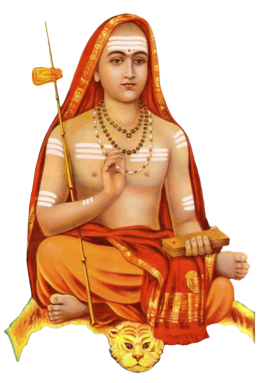प्रभवति परमात्मन्यद्वये निर्विशेषे ।
प्रविलसति समाधावस्य सर्वो विकल्पो
विलयनमुपगच्छेद्वस्तुतत्त्वावधृत्या ॥ ३५४ ॥
prabhavati paramātmanyadvaye nirviśeṣe |
pravilasati samādhāvasya sarvo vikalpo
vilayanamupagacchedvastutattvāvadhṛtyā || 354 ||
कुर्वन्नित्यं कलयति यतिः स्वस्य सर्वात्मभावम् ।
तेनाविद्यातिमिरजनितान्साधु दग्ध्वा विकल्पान्
ब्रह्माकृत्या निवसति सुखं निष्क्रियो निर्विकल्पः ॥ ३५५ ॥
kurvannityaṃ kalayati yatiḥ svasya sarvātmabhāvam |
tenāvidyātimirajanitānsādhu dagdhvā vikalpān
brahmākṛtyā nivasati sukhaṃ niṣkriyo nirvikalpaḥ || 355 ||
Free from action— i. e. selfish action.
श्रोत्रादि चेतः स्वमहं चिदात्मनि ।
त एव मुक्ता भवपाशबन्धैः
नान्ये तु पारोक्ष्यकथाभिधायिनः ॥ ३५६ ॥
śrotrādi cetaḥ svamahaṃ cidātmani |
ta eva muktā bhavapāśabandhaiḥ
nānye tu pārokṣyakathābhidhāyinaḥ || 356 ||
चोपाध्यपोहे स्वयमेव केवलः ।
तस्मादुपाधेर्विलयाय विद्वान्
वसेत्सदाकल्पसमाधिनिष्ठया ॥ ३५७ ॥
copādhyapohe svayameva kevalaḥ |
tasmādupādhervilayāya vidvān
vasetsadākalpasamādhiniṣṭhayā || 357 ||
कीटको भ्रमरं ध्यायन् भ्रमरत्वाय कल्पते ॥ ३५८ ॥
kīṭako bhramaraṃ dhyāyan bhramaratvāya kalpate || 358 ||
when caught by the worm known as Bhramarakita.
ध्यायन्नलित्वं ह्यलिभावमृच्छति ।
तथैव योगी परमात्मतत्त्वं
ध्यात्वा समायाति तदेकनिष्ठया ॥ ३५९ ॥
dhyāyannalitvaṃ hyalibhāvamṛcchati |
tathaiva yogī paramātmatattvaṃ
dhyātvā samāyāti tadekaniṣṭhayā || 359 ||
न स्थूलदृष्ट्या प्रतिपत्तुमर्हति ।
समाधिनात्यन्तसुसूक्ष्मवृत्या
ज्ञातव्यमार्यैरतिशुद्धबुद्धिभिः ॥ ३६0 ॥
na sthūladṛṣṭyā pratipattumarhati |
samādhinātyantasusūkṣmavṛtyā
jñātavyamāryairatiśuddhabuddhibhiḥ || 360 ||
त्यक्त्वा मलं स्वात्मगुणं समृच्छति ।
तथा मनः सत्त्वरजस्तमोमलं
ध्यानेन सन्त्यज्य समेति तत्त्वम् ॥ ३६१ ॥
tyaktvā malaṃ svātmaguṇaṃ samṛcchati |
tathā manaḥ sattvarajastamomalaṃ
dhyānena santyajya sameti tattvam || 361 ||
पक्वं मनो ब्रह्मणि लीयते यदा ।
तदा समाधिः सविकल्पवर्जितः
स्वतोऽद्वयानन्दरसानुभावकः ॥ ३६२ ॥
pakvaṃ mano brahmaṇi līyate yadā |
tadā samādhiḥ savikalpavarjitaḥ
svato’dvayānandarasānubhāvakaḥ || 362 ||
ग्रन्थेर्विनाशोऽखिलकर्मनाशः ।
अन्तर्बहिः सर्वत एव सर्वदा
स्वरूपविस्फूर्तिरयत्नतः स्यात् ॥ ३६३ ॥
granthervināśo’khilakarmanāśaḥ |
antarbahiḥ sarvata eva sarvadā
svarūpavisphūrtirayatnataḥ syāt || 363 ||
निदिंध्यासं लक्षगुणमनन्तं निर्विकल्पकम् ॥ ३६४ ॥
nidiṃdhyāsaṃ lakṣaguṇamanantaṃ nirvikalpakam || 364 ||
ब्रह्मतत्त्वमवगम्यते ध्रुवम् ।
नान्यथा चलतया मनोगतेः
प्रत्ययान्तरविमिश्रितं भवेत् ॥ ३६५ ॥
brahmatattvamavagamyate dhruvam |
nānyathā calatayā manogateḥ
pratyayāntaravimiśritaṃ bhavet || 365 ||
निरन्तरं शान्तमनाः प्रतीचि ।
विध्वंसय ध्वान्तमनाद्यविद्यया
कृतं सदेकत्वविलोकनेन ॥ ३६६ ॥
nirantaraṃ śāntamanāḥ pratīci |
vidhvaṃsaya dhvāntamanādyavidyayā
kṛtaṃ sadekatvavilokanena || 366 ||
निराशा च निरीहा च नित्यमेकान्तशीलता ॥ ३६७ ॥
nirāśā ca nirīhā ca nityamekāntaśīlatā || 367 ||
संरोधे करणं शमेन विलयं यायादहंवासना ।
तेनानन्दरसानुभूतिरचला ब्राह्मी सदा योगिनः
तस्माच्चित्तनिरोध एव सततं कार्यः प्रयत्नो मुनेः ॥ ३६८ ॥
saṃrodhe karaṇaṃ śamena vilayaṃ yāyādahaṃvāsanā |
tenānandarasānubhūtiracalā brāhmī sadā yoginaḥ
tasmāccittanirodha eva satataṃ kāryaḥ prayatno muneḥ || 368 ||
बुद्धौ धियं यच्छ च बुद्धिसाक्षिणि ।
तं चापि पूर्णात्मनि निर्विकल्पे
विलाप्य शान्तिं परमां भजस्व ॥ ३६९ ॥
buddhau dhiyaṃ yaccha ca buddhisākṣiṇi |
taṃ cāpi pūrṇātmani nirvikalpe
vilāpya śāntiṃ paramāṃ bhajasva || 369 ||
Witness—i. e. the Jivatman or individual aspect of the Self.
In this Sloka which reproduces in part Katha, Upanishad. I. iii, 13, one is asked to ascend higher and higher, restraining successively the sense-activities, and mental activities, from the gross to the fine, tilt at last one is lost in Samadhi.
यैर्यैर्वृत्तेःसमायोगस्ततद्भावोऽस्य योगिनः ॥ ३७0 ॥
yairyairvṛtteḥsamāyogastatadbhāvo’sya yoginaḥ || 370 ||
संदृश्यते सदानन्दरसानुभवविप्लवः ॥ ३७१ ॥
saṃdṛśyate sadānandarasānubhavaviplavaḥ || 371 ||
त्यजत्यन्तर्बहिःसङ्गं विरक्तस्तु मुमुक्षया ॥ ३७२ ॥
tyajatyantarbahiḥsaṅgaṃ viraktastu mumukṣayā || 372 ||
Vivekachudamani – Introduction
1: Devoted Dedication
2: Glory of Spiritual Life
3: Unique Graces in Life
4-7: Miseries of The Unspiritual Man
8-13: Means of Wisdom
14-17: The Fit Student
18-30: The Four Qualifications
31: Bhakti – Firm and Deep
32-40: Courtesy of Approach and Questioning
41-47: Loving Advice of the Guru
48-49: Questions of the Disciple
50: Intelligent Disciple – Appreciated
51-55: Glory of Self-Effort
56-61: Knowledge of the Self-Its Beauty
62-66: Direct Experience – Liberation
67-71: Discussion on Questions Raised
72-75: Gross Body
76-82: Sense Objects a Trap – Man Bound
83-86: Fascination for Body Criticised
87-91: Gross Body Condemned
92: Organs of Perception and Action
93-94: Inner Instruments
95: The Five Pranas
96-101: Subtle Body – Effects
102: Functions of Prāna
103-105: Ego Discussed
106-107: Infinite Love – the Self
108-110: Māyā – Pointed Out
111-112: Rajoguņa – Nature and Effects
113-116: Tamoguņa – Nature and Effects
117-119: Sattvaguņa – Nature and Effects
120-121: The Causal Body – Its Nature
122-123: Not-Self – Description
124-135: The Self – Its Nature
136: Advice for Self-control
137-142: What is Bondage – The Reply
143-144: The Powers – Agitation and Veiling
145-146: Bondage in Action
147-153: Ātman and Anātman – Discrimination
Negation of the Kośas
154-164: – Annamaya kośa (Food sheath)
165-166: – Prņamaya kośa (Vital air sheath)
167-183: – Manomaya kosa (Mental sheath)
184-188: – Vijnanamaya kośa (Intellectual sheath)
189-191: Ātman – Unattached
192-193: What is Liberation? – Disciple
194-206: Self-Knowledge gives Liberation
207-210: Anandamaya kośa (Bliss sheath)
211: Ātman – Other than the Five Kośas
212: What is Ātman? – Disciple
213-225: Nature of the Self – Discussion
226-236: All Manifestation Absolute
237-240: Brahman – Its Nature
241-249: That Thou Art – Explanation
250-253: Attitude in Meditation
254-266: Aids to Meditation
267-276: Give up Vāsanās – the Method
277-292: End Superimposition – The Means
293-297: The Perceived I’ Factor – False
298-309: Condemnation of the Ego
310-319: Actions, Thoughts and Vāsanās – Renounce
320-329: Total Vigilance – Its Price
330-338: In the One, No Plurality
339-348: Spiritual Growth – the Secret
349-353: Cause-Effect – False
354-372: Samadhi – Its Nature
373-378: Fully Detached – Samadhi Easy
379-383: Meditation – the Technique
384-397: Continuous Attention to Self
398-406: No Diversity in Reality
407-413: Ātma-vicāra – Contemplation
414-418: Give up Perceptions
419-425: The Science of Reality – Its Benefits
426-445: Signs of a Realised Seer
446-464: Prārabdha for a Saint
465-471: There is No Plurality
472-479: Experience of Selfhood
480-520: Practice of Knowledge – Disciple
521-575: Final Words of Advice
576-578: Blessed Disciple Liberated
579-581: The Glory of the Textbook

Vivekachudamani – Verses 354-372 – Vivekachudamani Verses 354-372 – By Adi Sankaracharya – In Sanskrit with English Meaning, Transliteration, Translation, Commenary, Lyrics, Audio – Vivekachudamani-354-372
